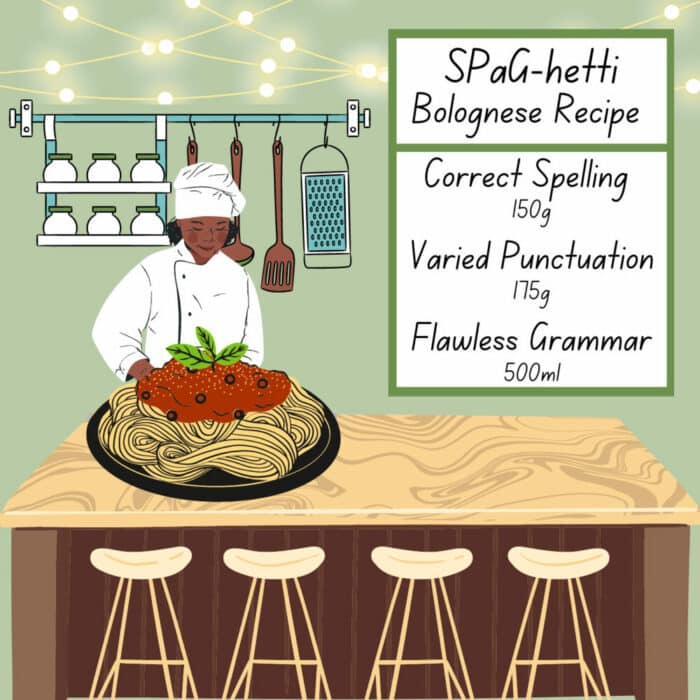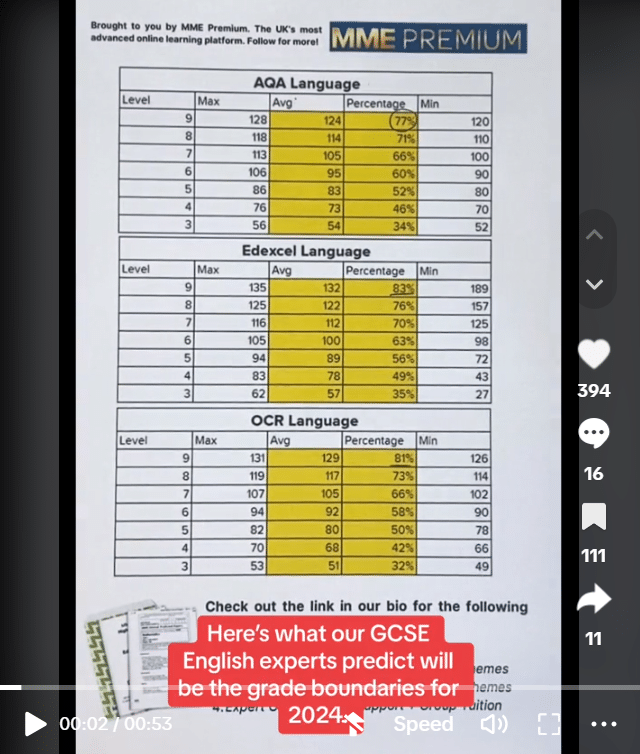Writing: SPaG
Writing: SPaG Revision
Why is SPaG Important?
Spelling, punctuation and grammar improve the clarity and coherence of your writing when done correctly.
Did you know that an enormous 16 marks of your answer can be gained through demonstrating ‘technical accuracy’?
In other words, this means spelling words correctly, getting your full stops and other punctuation in the right place and making sure you know the rules of grammar can make a massive difference to your overall mark.
However, whilst this is important, always remember that SPaG is not just useful in your writing exam, the skills you use for it can be applied to the reading exam, your professional work, in further education, and the world beyond!
Zooming in on the Mark Scheme
Each of these statements is on the writing section of the mark scheme for AQA GCSE English Language papers, but will mostly applicable to all other exam boards too.
As a result, we thought it would be helpful to understand what exactly is meant by each point.
With that in mind, let’s take a closer look at what your examiner will be marking you on in your writing exam.
- ‘Sentence demarcation is consistently secure and consistently accurate’
This means that you are using full stops and commas accurately to construct sentences.
- ‘Wide range of punctuation is used with a high level of accuracy’
Punctuation like semi colons, hyphens, commas and speech marks are all used confidently and correctly in your writing
- ‘Uses a full range of appropriate sentence forms for effect’.
A variation in sentence structure is important, using a range of short, impactful sentences and longer, more complex sentences help to keep your writing interesting and engaging.
- Uses Standard English consistently and appropriately with secure control of complex grammatical structures’
Don’t use slang or informal language unless it’s required in the question. Understanding of word order and sentence clause rules is also important.
- ‘High level of accuracy in spelling, including ambitious vocabulary’
Include complex or specialised language but only if you know you can spell it correctly.
- ‘Extensive and ambitious use of vocabulary’
Don’t be afraid to show off to the examiner and use a wide range of words to improve your writing!

Think of your answer like a recipe, combining multiple different ingredients like spelling, punctuation and grammar to form a cohesive piece.
How Do We Check For SPaG?
Read through your writing afterwards as if it was written by someone else, and break SPaG down into three separate sections to make it less overwhelming.
Check your spelling is correct first, then read through a second time for punctuation and do the same again for grammar.
Checking your writing this way means that you are less likely to miss things.
It may also help you to catch things previously missed on your first read through!

Some things to think about when checking:
Do you understand it?
Are your sentences grammatically correct?
Do you have run-on sentences?
This can occur as a result of something called ‘comma splicing‘.
Comma splicing is using a comma where a full stop would be the correct punctuation option.
Have you used a wide range of sophisticated punctuation in your answer?
Examples: Common Spelling Errors
Homophones – these are words that sound the same but have different spellings and meanings.
For example:
They’re/Their/There:
-
- ‘They’re‘ is the contraction of ‘they are’. For example, ‘they’re preparing to leave the house’.
- ‘Their‘ is a third person possessive noun, so it indicates ownership. For example, ‘their house overlooks the lake’.
- ‘There‘ is an adverb indicating a place or location. For example ‘the bowling alley is over there, behind the cinema’.
Your/You’re:
-
- ‘You’re‘ is a contraction of ‘you are’. For example, ‘you’re doing really well with revision’.
- ‘Your’ is a second person pronoun which indicates possession. For example, ‘that is your teapot?’.
Incorrect word usage – Here are some examples of words that aren’t quite homophones, but are often used incorrectly.
For example:
Off/Have/Of:
-
- ‘Should of’ is ungrammatical. Instead, write ‘should have‘, or ‘should’ve‘.
- ‘Off‘ is the opposite of ‘on’, whereas ‘of‘ is mainly used as a preposition. For example, ‘The colour of his hair was vibrant’.
Effect/Affect:
-
- The effect is happening to the subject, so it is the result or consequence of something. For example, ‘The hot sun has a burning effect on skin’.
- The affect means to act on or produce a change. For example, ‘a small change can affect the outcome of the test’.
Examples: Common Punctuation Errors
Missing and incorrect punctuation can change a sentence beyond recognition!
For example:
‘How dare you speak to me like that said the smiling father which didn’t seem like him at all and scared his daughter as a result.‘
Without punctuation here, the sentence is unclear and hard to read. It is easy for the reader to lose their place, and even interest.
Can you spot the independent and subordinate clauses?
Knowing the rules of punctuation can turn the above example into a complex sentence that will gain marks from the examiner.
For example:
‘“How dare you speak to me like that!” said the smiling father, which didn’t seem like him at all; scaring his daughter as a result.‘
Here the sentence is broken up and is easier to read. It’s clear who is talking, and the semi-colon seamlessly links the clauses together.
Examples: Common Grammar Errors
Subject-verb agreement: this sounds complex at first, but is as easy as using the correct tenses for the verbs and nouns you use!
For example:
She runs – The subject ‘she‘ is singular, so the verb needs to match.
They ran – The subject ‘they‘ is plural here, so the verb needs to match.
If you feel like you want to look at this in a bit more detail, head over to our our grammar page!



